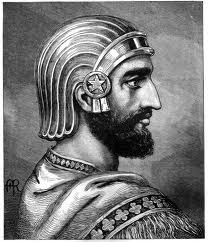By Miri –
–>
During these days of increasing tensions between Israel and Iran it is worthwhile to revisit the ancient interconnectedness between the Jewish people and what used to be and is still referred to by many as Persia.
 |
| Cyrus the Great |
Jews have been settling in the territories of today’s Iran for over 2700 years. The relationships between Jews and Persia thus date back to ancient times and are also referred to numerous times in the Bible. Most prominently, Cyrus the Great (ca. 600BC – 530 BC) founder of the Achaemenid or the First Persian Empire is said to have freed the Jews from Babylonian captivity and allowed the exiles to return to the Promised Land and to rebuild the destroyed temple in Jerusalem. Cyrus institutionalised a general policy of tolerance towards religious minorities throughout his whole empire.
The Jewish appreciation and gratefulness for Cyrus’ deeds are well documented in the Books of Ezra and Isaiah, the latter of which mentions him as the only gentile to be designated a Messiah, a divinely appointed leader.
The centuries following the establishment of the Persian Empire and Cyrus’ rule are marked both by sporadic expulsions, forced conversions to Islam and pogroms against the Jewish community, as well as by long periods of peaceful coexistence. As opposed to many other Muslim-majority countries that used to constitute the home of thriving Jewish communities, such as Syria, Iraq, Yemen, Morocco, Egypt and Algeria, the establishment of the Israeli state in 1948 did not lead to the vanishing of Iranian Jewry on the ground.
Although 85% of the community are believed to have left Iran since 1948, Iran still hosts the second largest Jewish community in the Middle East (after Israel, of course) and the largest Jewish community in any Muslim-majority country.
After Turkey, Iran became the second Muslim-majority country to recognise Israel as a sovereign nation. Looking back, it seems ironic that up until the Iranian Revolution in 1979, the two countries maintained close economic ties and are believed to have collaborated on numerous secretive military projects. After the overthrow of the Shah and the establishment of the Islamic Republic of Iran, however, Israel was soon declared an “enemy of Islam” and all official relations between the two states were cut off.
 |
| Scene from a Synagogue in Tehran |
The enmity between the two states did not affect the status of that part of the community that remained in Iran until today and after his return from exile, the revolution’s father, Ayatollah Khomeini issued a fatwa (an Islamic legal pronouncement) decreeing that Jews were to be protected. The Jewish community is thus officially recognised as a religious minority and as such is allocated a seat in the Iranian parliament. According to the community itself, it is fully free to practice its beliefs and runs a number of synagogues, Hebrew schools, a Jewish library, a newspaper and other social and cultural institutions. Interestingly, just like their Muslim compatriots, Iran’s Jews, who mainly led secular lives before the Islamic Revolution, also experienced a return to their religious roots and are now more observant to their beliefs.
While it cannot be denied that the Islamic Sharia law does contain discriminatory provisions against non-Muslim citizens, the Iranian Jewish community insists on being an essential part of the country. In 2007 a representative body of the Iranian Jewish community fiercely rejected the offer of a group of expatriate Iranian Jews to grant a sum of $10,000 to each individual who would leave Iran to immigrate to Israel. In a public statement the group affirmed that the Jewish community remained loyal to the Islamic Republic and that their Jewish Iranian identity was not for sale.
And those who left for Israel? Although being well integrated into Israeli society, many of the estimated 250,000 Jews of Persian descent living in Israel still cherish their cultural heritage. There are Persian restaurants, a magazine in Farsi, as well as a radio station broadcasting Iranian music, poetry and politics. The station is not only geared towards the community in Israel but via SMS and phone calls also gives voice to those Jews remaining in Iran. According to the volunteers running the station, it’s overall aim is to establish peace between the two countries.
 |
| Iranian reply to the “Israel Loves Iran” initiative |
More recently, after releasing an album of Persian classics in her native language Farsi, Iranian-born Rita, probably Israel’s most successful female singer, also unofficially rose to stardom in Iran and thus became a cultural ambassador between the two nations. Being Israeli products, Rita’s albums cannot be sold officially, but according to media reports there are a number of bootleg CD sellers in the back alleys of Tehran’s old bazaar selling her music.
Unsurprisingly Rita also joined the Facebook initiative Israel Loves Iran that publicises the voices of Israeli and Iranian civilians who fiercely oppose a war between their countries.
Unsurprisingly Rita also joined the Facebook initiative Israel Loves Iran that publicises the voices of Israeli and Iranian civilians who fiercely oppose a war between their countries.
There is obviously much more to say about this ancient relationship. Issues, such as Iranian President Ahmadinejad’s unacceptable stance on the Holocaust are not being denied, but were deliberately left out of this article in order to give room to the less publicised stories, which show the extent of the complexity of the inter-relationship between Persia and the Jews and which cannot and should not be reduced to the statements and actions of the Iranian and the Israeli leadership as they simply do not represent the opinions and feelings of neither the Iranian, nor the Jewish people.

Comment (0)